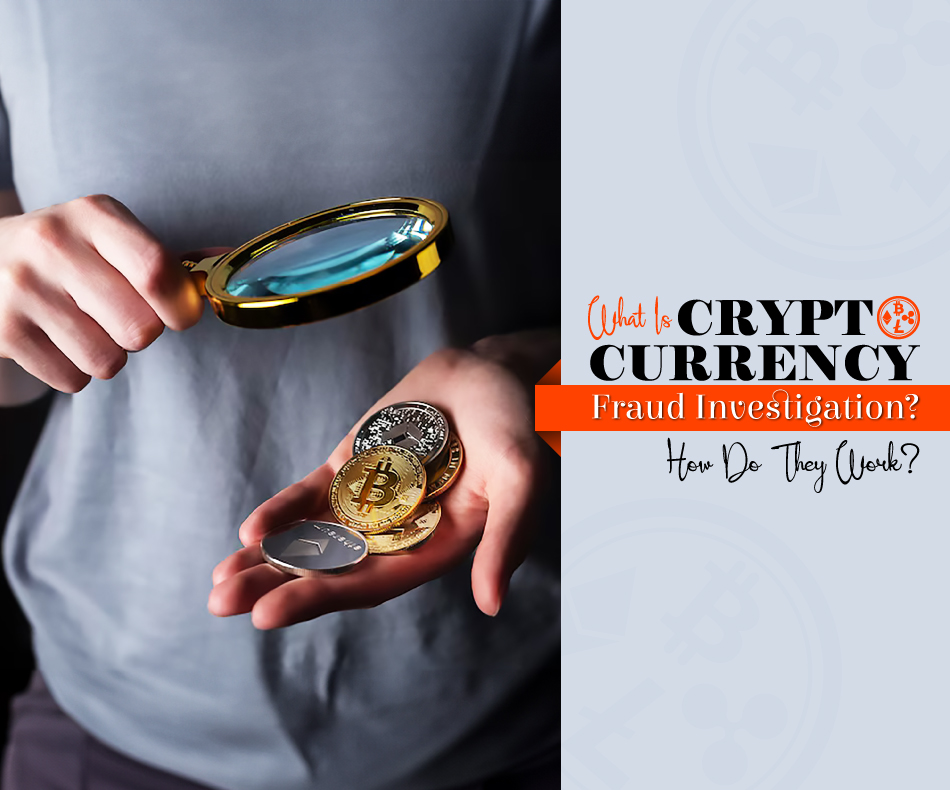As cryptocurrency gains popularity, so does the threat of fraud. Although digital currencies such as Bitcoin and Ethereum have new, thrilling possibilities, there are also new challenges. Among the largest threats today is crypto fraud, which can hit anyone from small-time investors to giant corporations. Here comes the role of cryptocurrency fraud investigation.
Let us deconstruct what crypto fraud is, how it is investigated, and why asset tracing is very important in recovering stolen or lost digital assets.
1. What is Cryptocurrency Fraud?
Cryptocurrency fraud is criminal or dishonest dealings with digital currencies. These scams can make one part with their private data, invest in phony projects, or send crypto to scammers.
Because cryptocurrencies are decentralized and anonymous, it is simpler for criminals to keep themselves hidden. It is hence more difficult to recover lost crypto if not properly investigated.
Some of the typical types of crypto fraud include:
- Bogus investment sites
- Phishing scams
- Pump-and-dump scams
- Wallet theft
- Ponzi and pyramid scams
Simply put, cryptocurrency fraud is just about any activity that leaves an individual or firm duped of their digital money.
2. What Are the Steps in a Cryptocurrency Fraud Investigation?
Cryptocurrency fraud is intricate to investigate. It entails following digital transactions through international networks and interpreting blockchain ledgers. Here is the process of how an investigation goes about:
- a) Case Assessment
The investigators start by collecting information from the victim. This comprises wallet addresses, transaction information, emails, and any communication with the fraudster.
- b) Blockchain Analysis
The blockchain, which logs all crypto transactions, is thoroughly scanned. Software is utilized to track where the crypto was sent to, even if it was divided among many wallets.
- c) Tracking Exchanges or Wallets
When suspicious wallets or transfers are identified, investigators try to track the exchanges involved. They might contact them to ask for user information (based on the location and legislation).
- d) Connecting Wallets to People
With the help of advanced equipment and in some cases, the assistance of law enforcement agencies, investigators attempt to connect wallets with actual people—this is a difficult but not impossible task.
- e) Reporting & Recovery Plan
After verifying the fraud, a report is then prepared. Legal procedures, including freezing the assets or reporting to law enforcement, may be followed in an attempt to recover the stolen crypto.
3. Types of Cryptocurrency Fraud
There are several types of crypto fraud, and being well-versed in them is the key to prevention. Some of the most common ones include:
- ICO Scams: Bogus initial coin offerings that offer high returns but are gone after raising funds.
- Phishing: Bogus emails or websites that steal login credentials and private keys.
- Rug Pulls: Developers leaving a crypto project after raising investor funds.
- Ponzi Schemes: A Scam where returns are paid to previous investors with funds gotten from newer ones.
Knowledge of these schemes aids in prevention and early discovery.
4. Regulation of Cryptocurrency
The lack of general regulation is one of the reasons why crypto fraud is on the increase. Cryptocurrency operates differently from traditional banks, as it lacks central control. Some nations have absolute rules, while others do not have any.
But regulators are closing in. Governments and financial regulators are developing guidelines to enhance the security of crypto transactions. Anti-money laundering (AML) and Know Your Customer (KYC) regulations are being implemented more extensively in exchanges.
This is good news for crypto users, as increased regulation implies greater security and enhanced detection of fraud.
5. Why Hire a Cryptocurrency Private Investigator?
When crypto fraud happens to you, it’s tempting to feel powerless. In contrast to credit card fraud, you can’t call a bank to cancel a transaction. That is why paying for professional cryptocurrency fraud investigation services is a good idea.
These professionals possess the equipment and expertise to:
- Follow difficult blockchain transactions
- Coordinate with international crypto exchanges
- Take evidence for litigation
- Assist you in developing a recovery case
A private detective is familiar with the technology and the legal procedures involved in crypto fraud recovery.
6. Asset Tracing Importance
Asset tracing is an important component of any cryptocurrency fraud case. It consists of discovering where the stolen assets have ended up, who owns them, and if they can be frozen or recovered.
Because crypto can be transferred from wallet to wallet or switched into other forms (such as NFTs or tokens) easily, time is of the essence. The sooner tracing is initiated, the greater the possibility for recovery.
Asset tracing technology can reveal wallet histories, track real-time activity, and even pinpoint patterns leading to a scammer’s name. In most successful instances, this has resulted in stolen assets being returned or assisting criminal prosecutions.
7. Common Cryptocurrency Scams to Be Aware of
Let us take a closer examination of common scams so you can identify the warning signs:
- Giveaway Scams: Free crypto offered in return for sending a little first, usually appearing on impersonated social media accounts.
- Romance Scams: Establishing online friendships to build trust and then requesting crypto.
- Impersonation Scams: Impersonated customer service or familiar figures requesting access to wallets.
- Malware Attacks: Software that secretly takes crypto wallet info or passwords.
Always check sources, re-check URLs, and never give your private keys to anyone.
8. Conclusion
As cryptocurrency becomes more popular, so too do the dangers that are associated with it. Crypto fraud does not discriminate and can affect anyone, but an understanding of how investigations operate and the importance of asset tracing can actually make all the difference to safeguard yourself and your assets.
Hiring experts, acting fast, and staying educated are the best practices for dealing with fraud if it happens. And don’t forget, the blockchain might be anonymous, but with the appropriate tools and skills, it’s not impossible to see.
Be vigilant, invest carefully, and if you are a victim, know that recovery is available with the proper assistance.



































